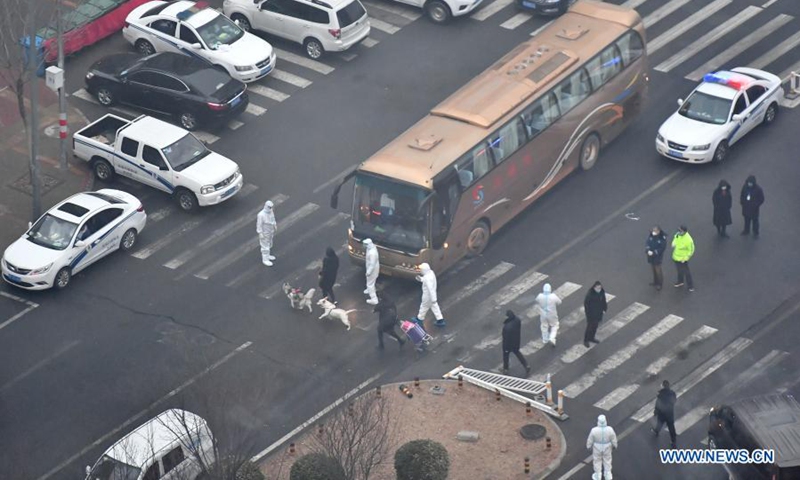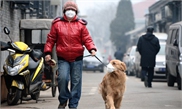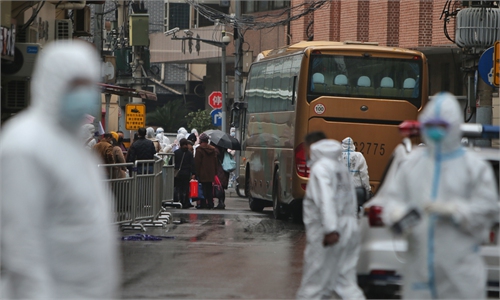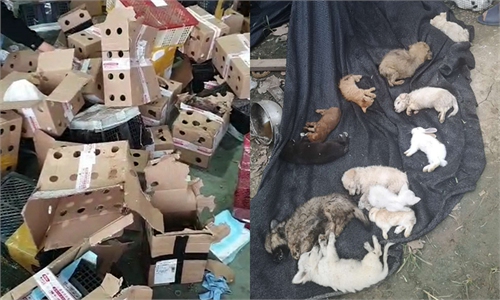IN-DEPTH / IN-DEPTH
Communities make efforts to protect animals amid COVID-19 quarantine measures

Residents are about to go to the COVID-19 quarantine center with their dogs in the Ronghui residential compound in Daxing's Tiangongyuan subdistrict, Beijing, capital of China, Jan. 25, 2021. Citizens who are quarantined at the COVID-19 quarantine center in Daxing District can have their pets with them during the observation starting from Monday. Professionals of animal epidemic prevention will be on the spot at the quarantine center. (Xinhua/Sun Ruibo)
"When we conduct nucleic acid tests on chickens, we need one person to pinch the beak and the other to reach into the chicken's throat with a cotton swab. Pigs are the most difficult animal to test, requiring three or four people to control their huge bodies and stick cotton swabs into their nostrils when they aren't looking," a member of staff engaged in animal health supervision surnamed Chen told the Global Times.
Chen is working in rural Gaocheng district in Shijiazhuang, North China's Hebei Province, which has been hard hit in the recent outbreak.
When people leave their homes for designated quarantine, what happens to the animals left behind has become a pressing problem for both livestock producers and pet owners in areas at high or medium risk of COVID-19.
Recently, due to the need for epidemic prevention and control, three of the worst-hit villages in Gaocheng district have conducted the transfer and isolation of the entire village population. After the villagers moved out, the Gaocheng District Animal Husbandry Station sent a temporary rescue service team, responsible for feeding the village's poultry and livestock and carrying out epidemic prevention measures until the villagers return home.
As of January 12, 5,435 people in these three villages had been transferred to designated isolation areas, but 48 families among them are engaged in the livestock industry, breeding poultry, cattle, sheep and pigs. All the animals faced food shortages when the people left, and this time of year is normally a busy period, China Youth Daily reported.
Since January 12, 18 members of staff from animal health supervision centers in several towns and villages in Gaocheng district, included Chen, have been working as temporary keepers and animal epidemic prevention coordinators in these villages.
"There must be someone to take care of these animals. If they starve, the villagers will suffer even greater losses," Chen said.
To find out whether animals carry the coronavirus, these temporary keepers have been working with the local CDC to conduct nucleic acid tests.
At present, nucleic acid sampling of animals in these three villages has been completed. Both batches of 150 samples tested negative.
According to Chen, they start work at 8 am, first contacting farmers on the phone to learn about their needs, then going to each animal shelter to disinfect and then feed them. They are busy until dark every day.
"During our inspections, we also found that many villagers left their dogs in the yard to guard the house, so we arranged a three-person 'dog feeding team,' carrying steamed buns, water and ladders to feed the dogs every day," Chen said.
A chicken producer reported that on the third day after his departure, his stockpile of chicken feed ran out, leaving about 3,000 chickens to drink only water. After the "temporary breeder" took over, as of January 22, there have been three batches of feed sent to his chicken farm by local authorities.
Currently, many regions in Shijiazhuang are also starting to set up work teams to provide guidance on animal epidemic prevention and support for animal feeding work in rural areas, an official of the Shijiazhuang municipal government told the Global Times.
As China has further improved the epidemic prevention and control measures, many cities have introduced policies to improve the living conditions of animals in COVID-19 high-risk areas, which has been widely praised by Chinese netizens.
Based on the recommendations of the disease control departments, Beijing's Daxing district and Shanghai's Huangpu district have both recently announced plans to arrange for close contacts to bring their pets to special quarantine sites and professional animal quarantine personnel have been deployed at quarantine points to provide anti-epidemic measures.
"The government's humanized governance logic makes us realize that under the current situation of regular epidemic prevention and control, every life can be treated well," a netizen commented.
Global Times



